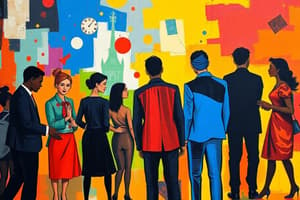Podcast
Questions and Answers
Which major sociological perspective is most useful for examining how students develop a sense of identity through interactions with teachers and peers?
Which major sociological perspective is most useful for examining how students develop a sense of identity through interactions with teachers and peers?
- Symbolic Interactionism (correct)
- Functionalism
- Marxism
- Conflict Theory
Which research method is most suitable for understanding the lived experiences of marginalized communities through detailed personal stories?
Which research method is most suitable for understanding the lived experiences of marginalized communities through detailed personal stories?
- Experiments
- Observational Studies
- Interviews (correct)
- Surveys
Which term encompasses the shared system of values, beliefs, and practices that shape how members of a society behave and interpret the world?
Which term encompasses the shared system of values, beliefs, and practices that shape how members of a society behave and interpret the world?
- Social Interaction
- Social Structure
- Culture (correct)
- Socialization
Which process involves individuals learning and internalizing the norms and values of their society, enabling them to function effectively within it?
Which process involves individuals learning and internalizing the norms and values of their society, enabling them to function effectively within it?
How would a sociologist applying functionalism view the role of education in society?
How would a sociologist applying functionalism view the role of education in society?
Which sociological perspective focuses on how power imbalances and social inequalities shape social life?
Which sociological perspective focuses on how power imbalances and social inequalities shape social life?
Which research method involves systematically observing people in natural settings to understand their behaviors and interactions?
Which research method involves systematically observing people in natural settings to understand their behaviors and interactions?
Which area of sociological study examines the production, distribution, and consumption of goods and services?
Which area of sociological study examines the production, distribution, and consumption of goods and services?
What is the term for the increasing interconnectedness of societies around the world, driven by factors such as trade, technology, and migration?
What is the term for the increasing interconnectedness of societies around the world, driven by factors such as trade, technology, and migration?
How do sociologists define a 'society'?
How do sociologists define a 'society'?
Within the context of sociology, what do social institutions primarily accomplish?
Within the context of sociology, what do social institutions primarily accomplish?
How is the concept of 'social inequality' best understood in sociological terms?
How is the concept of 'social inequality' best understood in sociological terms?
Which statement correctly describes the role of social movements in society?
Which statement correctly describes the role of social movements in society?
What is a key goal of sociology in relation to social issues?
What is a key goal of sociology in relation to social issues?
A researcher wants to study the effects of a new educational program on student performance. Which research method would be most appropriate?
A researcher wants to study the effects of a new educational program on student performance. Which research method would be most appropriate?
Which concept refers to the hierarchical arrangement of individuals and groups in society based on factors such as class, race, and gender?
Which concept refers to the hierarchical arrangement of individuals and groups in society based on factors such as class, race, and gender?
How might a sociologist using conflict theory analyze the criminal justice system?
How might a sociologist using conflict theory analyze the criminal justice system?
Which of the following best describes the focus of symbolic interactionism?
Which of the following best describes the focus of symbolic interactionism?
Which of the following is an example of social change?
Which of the following is an example of social change?
What role does culture play in shaping individual behavior?
What role does culture play in shaping individual behavior?
Flashcards
Sociology
Sociology
Systematic study of human society and social interaction, examining structures, institutions, and processes shaping behavior and social life.
Social Structure
Social Structure
Organized patterns of social relationships and institutions composing a society.
Culture
Culture
Shared values, beliefs, norms, symbols, language, and material objects characterizing a society, guiding social behavior.
Socialization
Socialization
Signup and view all the flashcards
Social Interaction
Social Interaction
Signup and view all the flashcards
Social Inequality
Social Inequality
Signup and view all the flashcards
Social Change
Social Change
Signup and view all the flashcards
Functionalism
Functionalism
Signup and view all the flashcards
Conflict Theory
Conflict Theory
Signup and view all the flashcards
Symbolic Interactionism
Symbolic Interactionism
Signup and view all the flashcards
Surveys
Surveys
Signup and view all the flashcards
Experiments
Experiments
Signup and view all the flashcards
Observational Studies
Observational Studies
Signup and view all the flashcards
Interviews
Interviews
Signup and view all the flashcards
Secondary Data Analysis
Secondary Data Analysis
Signup and view all the flashcards
Family (Sociological Study)
Family (Sociological Study)
Signup and view all the flashcards
Education (Sociological Study)
Education (Sociological Study)
Signup and view all the flashcards
Religion (Sociological Study)
Religion (Sociological Study)
Signup and view all the flashcards
Economy (Sociological Study)
Economy (Sociological Study)
Signup and view all the flashcards
Politics (Sociological Study)
Politics (Sociological Study)
Signup and view all the flashcards
Study Notes
- Sociology is the systematic study of human society and social interaction.
- It examines the structures, institutions, and processes that shape human behavior and social life.
- Sociologists seek to understand how societies are organized, how they change, and how individuals experience and are influenced by their social world.
- Sociology explores various aspects of social life, including culture, social institutions (e.g., family, education, government), social inequality, social change, and social interactions.
- It employs diverse research methods, such as surveys, interviews, experiments, and observations, to gather and analyze data about social phenomena.
- Sociological theories provide frameworks for interpreting and explaining social patterns and processes.
- The sociological perspective emphasizes the importance of understanding individual behavior within its broader social context.
- It encourages critical thinking about social issues and challenges taken-for-granted assumptions about the world.
- Sociology aims to promote social awareness, social justice, and positive social change.
Key Concepts in Sociology
- Social Structure: Refers to the organized patterns of social relationships and institutions that compose society.
- Culture: Encompasses the shared values, beliefs, norms, symbols, language, and material objects that characterize a society and guide social behavior.
- Socialization: The process by which individuals learn and internalize the values, beliefs, and norms of their society, enabling them to function as members of that society.
- Social Interaction: The ways in which people communicate and interact with each other, shaping social relationships and social reality.
- Social Inequality: The unequal distribution of resources, opportunities, and power within a society, based on factors such as class, race, gender, and age.
- Social Change: The transformation of social structures, institutions, and cultural patterns over time.
Major Sociological Perspectives
- Functionalism: Views society as a complex system of interdependent parts that work together to maintain stability and social order. -Emphasizes the functions of social institutions in meeting the needs of society. -Focuses on social consensus, integration, and equilibrium.
- Conflict Theory: Examines society as characterized by inequality and conflict over scarce resources. -Focuses on power struggles, social stratification, and social change. -Highlights the role of ideology in maintaining social inequality.
- Symbolic Interactionism: Focuses on micro-level interactions and the ways in which individuals create meaning through symbols and communication. -Emphasizes the role of language, gestures, and shared understandings in shaping social behavior. -Focuses on the social construction of reality.
Research Methods in Sociology
- Surveys: Collect data from a sample of individuals through questionnaires or interviews. -Used to measure attitudes, beliefs, behaviors, and demographic characteristics.
- Experiments: Manipulate one or more variables to determine their effect on other variables. -Used to test hypotheses and establish cause-and-effect relationships.
- Observational Studies: Observe and record social behavior in natural settings. -Used to gain insights into social processes and behaviors in real-world contexts.
- Interviews: Conduct in-depth conversations with individuals to gather detailed information about their experiences and perspectives.
- Secondary Data Analysis: Analyze existing data sources, such as government statistics or historical records. -Used to study social trends and patterns over time.
Major Areas of Sociological Study
- Family: Examines the structure, functions, and dynamics of families, as well as issues such as marriage, divorce, parenting, and family violence.
- Education: Studies the role of education in transmitting knowledge, skills, and values, as well as issues such as educational inequality and school reform.
- Religion: Examines the social organization, beliefs, and practices of religious institutions, as well as the role of religion in shaping social behavior and social change.
- Economy: Studies the production, distribution, and consumption of goods and services, as well as issues such as economic inequality, globalization, and work.
- Politics: Examines the distribution of power and the processes of decision-making in society, as well as issues such as political participation, social movements, and government policy.
- Deviance and Crime: Studies behaviors that violate social norms and laws, as well as the social control mechanisms used to regulate deviance and crime.
- Social Stratification: Examines the hierarchical arrangement of individuals and groups in society based on factors such as class, race, gender, and age.
- Social Change: Studies the transformation of social structures, institutions, and cultural patterns over time, as well as the factors that drive social change.
Society
- A society is a group of people who live in a defined territory and share a common culture.
- Societies are characterized by patterns of social relationships, social institutions, and shared values and beliefs.
- Societies vary in size, complexity, and degree of social inequality.
- Societies can be studied at different levels of analysis, from micro-level interactions to macro-level social structures.
- Sociologists use a variety of theoretical perspectives and research methods to study societies and understand their dynamics.
- Culture is the shared way of life of a society, including its values, beliefs, norms, symbols, language, and material objects.
- Culture is transmitted from one generation to the next through socialization.
- Culture influences people's behavior, attitudes, and perceptions of the world.
- Societies are constantly changing in response to internal and external factors.
- Social change can be gradual or rapid, and it can have both positive and negative consequences.
- Globalization is the increasing interconnectedness of societies around the world, driven by factors such as trade, technology, and migration.
- Globalization has profound effects on societies, including cultural diffusion, economic integration, and the spread of ideas and information.
- Social institutions are the organized patterns of social behavior that are established and enduring features of a society.
- Examples of social institutions include the family, education, religion, the economy, and the government.
- Social institutions perform important functions for society, such as socializing members, providing for basic needs, regulating behavior, and maintaining social order.
- Social inequality is the unequal distribution of resources, opportunities, and power within a society.
- Social inequality can be based on factors such as class, race, gender, age, and sexual orientation.
- Social inequality has significant consequences for individuals and society, including disparities in health, education, and economic well-being.
- Social movements are organized efforts by groups of people to promote or resist social change.
- Social movements can be powerful forces for social change, challenging existing power structures and advocating for new policies and practices.
- Social movements can be peaceful or violent, and they can operate at the local, national, or global level.
- Sociology provides valuable insights into the nature of society and the challenges and opportunities facing individuals and communities.
- By understanding the social forces that shape our lives, we can work to create a more just and equitable society.
- Sociology encourages critical thinking, empathy, and a commitment to social justice.
Studying That Suits You
Use AI to generate personalized quizzes and flashcards to suit your learning preferences.




